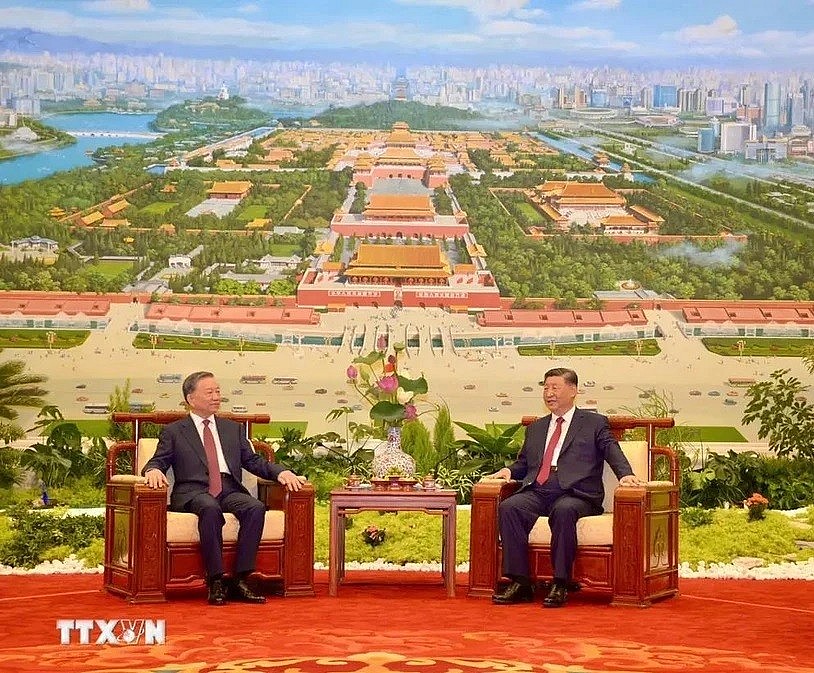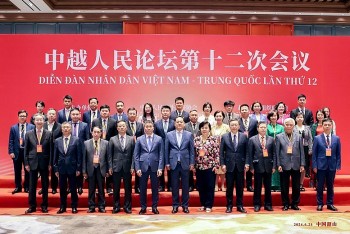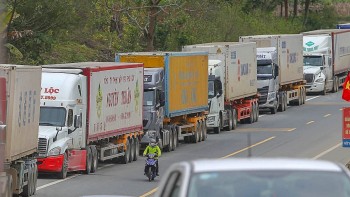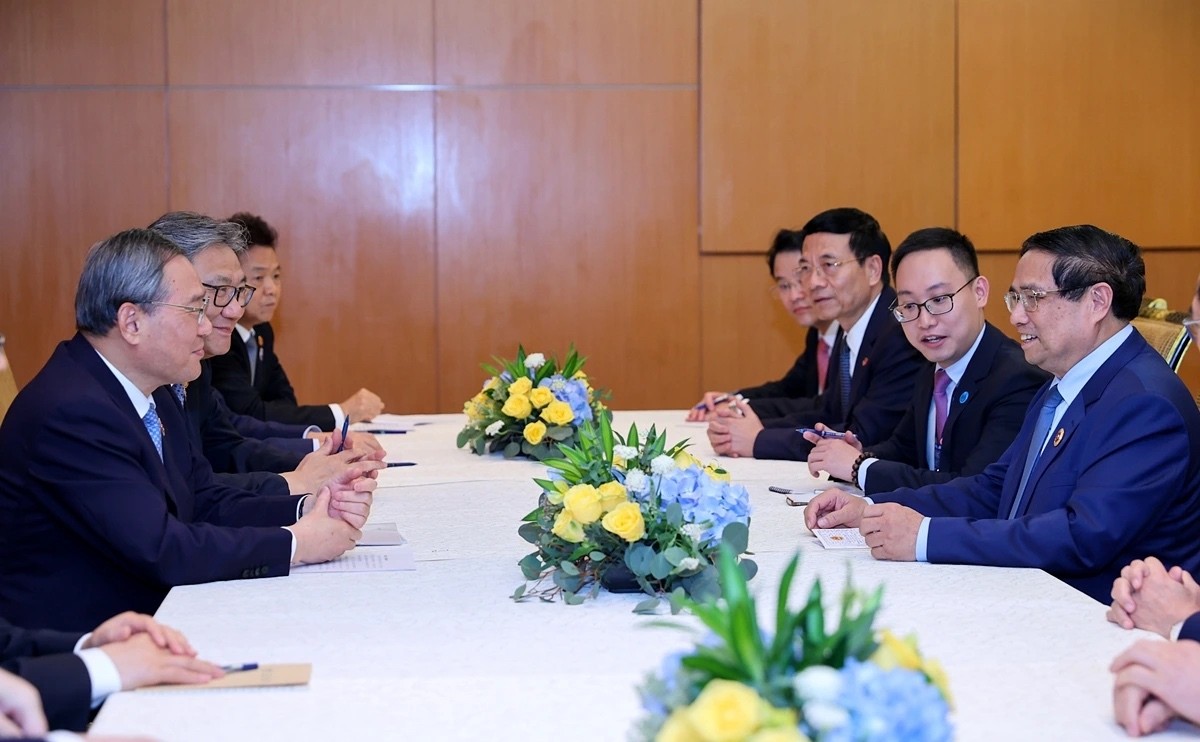Vietnam, China Issue Joint Statement on General Secretary, President To Lam Visit
| Chinese Friendship Ambassadors Foster Enduring Vietnam-China Ties | |
| Chinese Public Hails Positive Strides in Vietnam-China Ties |
 |
| General Secretary of the Communist Party of Vietnam Central Committee, President of Vietnam To Lam (L) and his Chinese counterpart Xi Jinping (Photo: VNA) |
Following is the Vietnam News Agency’s translation of the joint statement
1. At the invitation of General Secretary of the Communist Party of China Central Committee, President of the People's Republic of China Xi Jinping, General Secretary of the Communist Party of Vietnam Central Committee, President of the Socialist Republic of Vietnam To Lam paid a state visit to China from August 18 - 20, 2024.
During the visit, General Secretary, President To Lam held talks with General Secretary, President Xi Jinping, had meetings with Premier Li Qiang, Chairman of the Standing Committee of the National People's Congress of China Zhao Leji, and Chairman of the National Committee of the Chinese People's Political Consultative Conference Wang Huning. In an atmosphere of sincerity and friendship, the two sides informed each other about the situation of their respective parties and countries, exchanged in-depth opinions, reached important common perceptions on further strengthening the comprehensive strategic cooperative partnership between the two countries, and promoting the building of the Vietnam-China community with a shared future in the new situation, and discussed international and regional issues of mutual common concern.
2. The Communist Party of Vietnam and the Communist Party of China are the two ruling Communist parties in the world, carrying a historic mission, striving for the happiness of the people, for national development, and for peace and progress of mankind. In the cause of struggling for national independence and national liberation, the two Parties, two countries and people of Vietnam and China provided assistance and supported each other, establishing the Vietnam-China traditional friendship as both comrades and brothers. This year marks 100 years since President Ho Chi Minh came to Guangdong for revolutionary activities; 2025 sees the 75th anniversary of the establishment of diplomatic relations between Vietnam and China, and the 95th anniversary of the founding of the Communist Party of Vietnam.
Entering a new era, the two sides will not forget their initial wish of friendship, engrave the common mission, steadfastly pursue the path to socialism and promote modernisation in line with each country's situation, follow the Vietnam - China friendship path that has been established by generations of leaders of the two parties and two countries, continue to deepen and elevate the comprehensive strategic cooperative partnership between the two countries, together build the Vietnam-China community with a shared future that carries strategic significance, promote relations between the two Parties and two countries to a new height, strive for the happiness of the people and strong and prosperous country, for the development of the socialist cause, and for the cause of peace and progress of humankind.
3. The Vietnamese side warmly congratulates China on the 75th anniversary of its founding, the successful organisation of the third plenum of the 20th Communist Party of China Central Committee, and highly values the great achievements China has achieved in the new period; believes that China-style modernisation has opened up choices of paths and implementation plans for the autonomous development of developing countries; China's comprehensive reform and door-opening of foreign affairs at a high level will bring new momentum and new opportunities for the development of other countries. The Vietnamese side wishes and believes that under the steadfast leadership of the Communist Party of China Central Committee with comrade Xi Jinping as the core, under the orientation of Xi Jinping Thought on socialism with Chinese characteristics in the new era, the Party, Government and people of China will comprehensively build a modern socialist power and successfully realise the goals for the second centenary.
The Chinese side congratulates Vietnam on and highly values its important achievements obtained in nearly 40 years of reform and nearly 15 years of implementing the "Platform for national building in the transition period to socialism" (supplemented and developed in 2011), especially the important, outstanding and comprehensive accomplishments since the 13th National Party Congress, thus promoting Vietnam's combined strength and international influence to the highest ever level. The Chinese side wishes and believes that under the sound leadership of the Communist Party of Vietnam Central Committee, headed by comrade To Lam, the Party, State and People of Vietnam will successfully implement the goals and tasks set by the 13th National Party Congress, make thorough preparations and successfully organise the 14th National Party Congress in 2026, build Vietnam into a socialist-oriented high income developed country by 2045. The Chinese side affirms its support for Vietnam's prosperous development, happy people, building of a strong, independent, self-reliant economy, along with promoting synchronously the cause of renewal, industrialisation, modernisation, comprehensive international integration, developing foreign relations of friendship, and bringing into play the increasingly important role for peace, stability, development and prosperity of the region and the world.
4. China emphasises its persistent policy of friendship with Vietnam and always considers Vietnam a priority in its neighbourhood diplomacy. Vietnam affirms that the country always considers relations with China a top priority in its foreign policy of independence, self-reliance, multilateralisation, and diversification. These are the strategic choices of the two sides.
The two sides underline the need to seriously implement the common perception and results achieved during the bilateral visits of the top leaders of the two Parties and two countries, especially the two historic visits by late General Secretary Nguyen Phu Trong to China in 2022 and General Secretary and President Xi Jinping to Vietnam in 2023, along with the "Joint Statement on continuing to promote and deepen the Vietnam-China comprehensive strategic cooperative partnership" and the "Joint Statement on continuing to deepen and elevate comprehensive strategic cooperative partnership between the two countries, and building a Vietnam-China community with a shared future that carries strategic significance" issued during the two visits, respectively. They also emphasises the need to adhere to the “16-word” motto and the “four-good” spirit, persistently implement the “six major” directions, namely higher political trust, more practical and deeper defence - security cooperation, more substantive and deeper cooperation, more solid social foundation, closer multilateral coordination, and better control and settlement of differences; promote the building of the Vietnam-China community with a shared future to gain more substantive results, striving for the happiness of the people and the prosperity of the country, for the cause of peace and progress of mankind.
5. The two sides affirm to maintain strategic exchanges between high-ranking leaders of the two Parties and two countries, and jointly orient the development of the Vietnam-China relationship. They will fully promote the special role of the Party channel, further strengthen the overall coordination role of the exchange and cooperation mechanisms between the two Parties, especially high-level meetings, theoretical workshops between the two Parties, and exchanges between the two Parties' agencies of foreign affairs; improve the effectiveness of cooperation between the respective agencies of the two Parties at the central level and Party committees at the local level, especially in provinces/border areas; comprehensively implement theoretical exchanges and experience sharing in Party and nation management; jointly deepen awareness of the Communist Party's ruling regulations, the law of building socialism, and the law of human development to serve Party building and the development of the socialist cause of each side; and strengthen friendly exchanges and promote the role of the cooperation committee mechanisms between the National Assembly of Vietnam and the National People's Congress of China, friendly exchanges between organisations at the central level and border provinces of the Vietnam Fatherland Front Central Commitee and the Chinese People's Political Consultative Conference. The two sides agree that the Vietnam-China Steering Committee for Bilateral Cooperation strengthens overall coordination, directs ministries, sectors and localities of the two countries to build the Vietnam-China community with a shared future, and enhance mechanisms and forms of exchange and cooperation in strategic areas such as diplomacy, defence and security.
The Vietnamese side reaffirms its adherence to the "One China" policy, recognising that there is only one China in the world, Taiwan is an inseparable part of China's territory, and that the government of the People’s Republic of China is the sole legitimate government representing all of China. Vietnam supports the peaceful development of cross-strait relations and China’s great cause of reunification, resolutely opposes any dividing act for "independent Taiwan" in all forms and does not develop any state-level relations with Taiwan. Vietnam considers issues related to Hong Kong, Xinjiang, and Tibet as internal affairs of China and believes that under the leadership of the Chinese Party and Government, these regions will maintain stability and develop prosperously. China supports Vietnam in maintaining social stability, ensuring national security, development, and national solidarity.
6. The two sides affirm that defence - security cooperation is one of the pillars of Vietnam-China relations. They agree to enhance defence - security cooperation, strengthen exchanges at all levels between the two countries' armies through channels such as the border defence friendship exchange, and defence and security dialogue, deepen border, naval, and coast guard exchanges; and promote cooperation in areas such as political work, defence industry, mutual visits of naval ships, and United Nations peacekeeping. The two sides enhance mechanisms between the Ministries of Public Security of the two countries, such as the ministerial conference on crime prevention cooperation, strategic security dialogue, and political security working group; promote cooperation in areas such as combating telecom fraud, cybersecurity, economic crime, human trafficking, organisation of illegal immigration, and tracking and recovering assets of criminals who have fled abroad; coordinate to establish a hotline between the two countries' Ministries of Public Security, expedite the ratification of the state-level agreement on the transfer of sentenced persons between Vietnam and China, and establish and expand cooperation between Vietnam's Ministry of Public Security and China's Ministry of Emergency Management. The two countries strengthen information exchanges and share experiences on countering interference, combating separatism, preventing "colour revolution," and jointly protect political security and regime security; and expand legal and judicial cooperation to ensure a legal foundation for collaboration in various fields between Vietnam and China.
7. The two sides agree to promote development strategy connectivity between the two countries, effectively implement the cooperation plan connecting the "Two Corridors, One Belt" Framework with the "Belt and Road" Initiative; accelerate "hard connectivity" in terms of railways, expressways and border gate infrastructure; upgrade "soft connectivity" in smart customs; China agrees to provide assistance for Vietnam to develop the planning of the Lang Son - Hanoi and Mong Cai - Ha Long - Hai Phong standard gauge railway lines, develop a Feasibility Study Report for the Lao Cai - Hanoi - Hai Phong standard gauge railway line. Hastening the pilot construction of smart border gates at the Huu Nghi (Vietnam) – Youyi Guan (China) international border gate and the dedicated cargo transport road in the area of boundary markers 1088/2 - 1089 (Tan Thanh - Po Chai). Actively researching and deploying pilot construction of cross-border economic cooperation zones, jointly building safe and stable production and supply chains.
The two sides encourage and support enterprises with capacity, reputation and advanced technology to invest in the other country, with a focus on enhancing cooperation in hi-tech agriculture, infrastructure, clean energy, digital economy and green development; create a fair and favourable business environment for each other's enterprises. Deepening the exchange of experiences on state-owned enterprise reform and management, collaborating in human resources training; actively studying greater cooperation in the key mineral sector. Making good use of the financial and monetary cooperation working group between the two countries, enhancing information exchange and experience sharing on policy management and reform in the financial-monetary field, and boosting monetary cooperation. Accelerating the implementation of economic and technical cooperation projects such as the Traditional Medicine Hospital (Subsidiary 2).
Eeffectively upholding the role of the Regional Comprehensive Economic Partnership (RCEP) and the ASEAN-China Free Trade Area (ACFTA); making good use of e-commerce platforms and trade fairs; enhancing customs cooperation and expanding the export of each country’s key products to the other. China is ready to continue creating favourable conditions for Vietnam to open additional trade promotion offices in various locations in China. Vietnam supports China’s accession to the Comprehensive and Progressive Agreement for Trans-Pacific Partnership (CPTPP) based on adherence to the agreement's standards and procedures, and actively welcomes Hong Kong Special Administrative Region of China's application to join the RCEP.
8. Both sides affirm commitment to preserving the traditional friendship, upholding shared ideals and missions, and consistently promoting popularisation work on the Vietnam-China friendship. The two sides declare 2025 as the "Year of Vietnam-China Humanistic Exchange" and will jointly organise a series of activities to celebrate the 75th anniversary of the establishment of diplomatic relations between Vietnam and China. Through Party, youth and friendly city channels, effectively utilising "red relic sites" in localities such as Guangxi, Yunnan, Guangdong, and Chongqing, and holding activities in research, education, culture, and tourism in diverse forms. Encouraging more tourists to visit the other country. Promoting the role of the China Cultural Centre in Vietnam and welcoming Vietnam’s establishment of a cultural centre in China; encouraging cooperation in media, news, publishing, broadcasting, studying collaboration in vocational training, strengthening exchanges and collaboration in medicine, health care, traditional medicine, disaster prevention and mitigation.
9. The two sides affirm to strengthen coordination and multilateral cooperation that aligns with the building of the Vietnam-China Community with a shared future that carries strategic significance. The two sides should persevere in the "Five Principles of Peaceful Coexistence" and basic norms of international relations, jointly protect the international system with the United Nations as its core and the international order with international law as its foundation, protect international justice, fairness and the common interests of developing countries. Resolutely promoting an equal, orderly multipolar world and comprehensive, inclusive and sustainable economic globalisation. The two sides agree to step up cooperation within the framework of the major initiatives - Community with a Shared Future for Mankind, the Global Development Initiative, the Global Security Initiative and the Global Civilisation Initiative, which aim to protect the common interests of all mankind, for the cause of peace, justice and progress of people all over the world, and meet the aspirations of people worldwide for a better world. The two sides advocate human rights exchanges and cooperation based on equality and mutual respect, firmly opposed the "politicisation," "instrumentalisation," and double standards in human rights issues, and resolutely protested the use of human rights issues to interfere in the internal affairs of other countries. Strengthening coordination and cooperation in multilateral mechanisms such as the United Nations and the Asia-Pacific Economic Cooperation (APEC) forum, and supporting each other's candidacy for international organisations. China supports Vietnam in hosting APEC 2027 and backs Vietnam's accession and promotion of its role in multilateral mechanisms.
The two sides agree to jointly promote open regional cooperation. China supports ASEAN in building an ASEAN Community of solidarity, unity, self-reliance and development, and in maintaining its central role in the ever-evolving regional architecture; works together with ASEAN countries to advance the initiative of creating the "5 Common Homes" of peace, security, prosperity, beauty and friendship; accelerates the development of the ASEAN-China Free Trade Area 3.0. Stepping up the implementation of cooperation areas within the framework of Mekong-Lancang cooperation, striving to promote the building of a Community with a Shared Future for Mekong-Lancang countries for peace and prosperity; promoting cooperation within the Greater Mekong Sub-region (GMS) economic cooperation framework.
10. The two sides discuss in depth and in a sincere, straightforward manner sea issues, stressing the need for better control and active handling of disagreement at sea, and maintenance of peace, stability in the East Sea and the region.
The two sides agree on the need to adhere to the common perceptions of high-ranking leaders of the two Parties and countries, together maintain peace, stability in the East Sea, persevere in friendly consultation to actively seek essential and long-term solutions acceptable to both sides in accordance with the Vietnam-China agreement on basic principles guiding the settlement of sea-related issues and international law, including the 1982 UN Convention on the Law of the Sea, take no action that can complicate the situation or extend disputes. Pushing ahead with discussion on cooperation for common development at sea and the delimitation of sea area beyond the mouth of the Gulf of Tonkin towards early substantial progress, actively promoting cooperation in less sensitive sea-related fields. Continuing to implement comprehensively and effectively the Declaration on the Conduct of Parties in the East Sea (DOC), working on the basis of consensus consultation towards a substantive, effective Code of Conduct in the East Sea in accordance with international law, including the 1982 UN Convention on the Law of the Sea. Continuing to coordinate to effectively implement the legal documents on land border and related agreements, promoting cooperation in areas along the Vietnam-China land border, well organise activities marking the 25th anniversary of the signing of the Vietnam-China land border treaty and 15 years since the signing of the three legal documents on Vietnam-China land border.
11. During the visit, the two sides signed documents on cooperation in Party school, connectivity, industry, finance, customs plant quarantine, healthcare, press and broadcasting, locality cooperation and social affairs and livelihood.
12. The two sides reach unanimity that the state visit to China of Party General Secretary and President To Lam is a success, significantly promoting the building of the Vietnam-China community with a shared future that carries strategic significance that is conducive to peace, stability and development in the region and the world.
Party General Secretary and President To Lam thanked the Chinese side for the warm and friendly welcome and invited Party General Secretary and President Xi Jinping to visit Vietnam again early. Party General Secretary and President Xi Jinping thanked and accepted the invitation with pleasure.
Beijing, August 20, 2024.
 | People-to-People Ties Strengthen Vietnam-China Relations According to Vietnamese Ambassador to China Pham Sao Mai, local and people-to-people exchanges between Vietnam and China have been vibrant in recent years, yielding numerous ... |
 | Vietnam-China: A New Era of Trade And Investment China is currently Vietnam's largest trading partner, while Vietnam is China's largest trading partner within ASEAN. China is also the leading FDI investor in terms ... |
Recommended
 National
National
Shangri-La Dialogue 22: Vietnam Highlights Some Issues of Ensuring Stability in a Competitive World
 National
National
Vietnam News Today (Jun. 3): PM Pham Minh Chinh to Attend UN Ocean Conference, Visit Estonia, Sweden
 National
National
Vietnam News Today (Jun. 2): Vietnamese Trade Mission Sounds Out Business Opportunities in United States
 National
National
Vietnam News Today (Jun. 1): Vietnamese, Japanese Firms Foster Partnership
 National
National
Vietnam News Today (May 31): Vietnam Strongly Supports Laos’s National Development
 National
National
Vietnam News Today (May 30): Vietnam, Venezuela Reinforce Ties Through People-to-people Diplomacy
 National
National
Vietnam News Today (May 29): Vietnam and Hungary to Expand Cooperation into New Areas
 National
National
